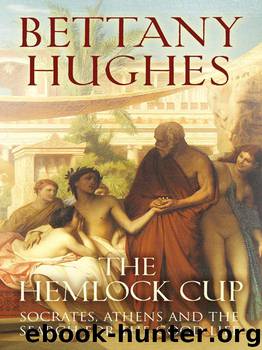The Hemlock Cup: Socrates, Athens, and the Search for the Good Life by Bettany Hughes

Author:Bettany Hughes
Language: eng
Format: mobi, epub
Tags: Philosophers, Ancient, Philosophy, Athens, General, Athens (Greece), Biography & Autobiography, Socrates, Greece, Philosophers - Greece - Athens, Ancient & Classical, History & Surveys, Biography, History
ISBN: 9780307595294
Publisher: Knopf Doubleday Publishing Group
Published: 2011-02-08T08:00:00+00:00
Beauty in Athens at this time was seriously considered to be the sign of a brilliant and noble spirit; a gift of the gods. Those laudable qualities that justified privilege and dominance were believed, naturally, to have been given an appropriately attractive shell. And all those heroically naked paragons around the city itself (both the living, breathing men in the gymnasia and the bronze and marble statues) reflected the visual experience of Athens – this was a land where men stripped to exercise, to bathe, to talk, to worship their gods, to work in the fields. The goddess Athena was honoured by a city-wide kallisteion, an all-male beauty contest at the time of the Pan-Athenaea. The winning beauty was handsomely rewarded with more than one hundred amphoras of sacred olive oil. In Socrates’ Athens the ‘body-beautiful’ also signified a beautiful mind.10 Being beautiful meant that you possessed a moral beauty; kalon in Greek means ‘fine’ and ‘praiseworthy’ as well as ‘fit’.
And so the notion proposed here, that inner beauty can sometimes be contained within a hoary shell, is radical. In the Socratic canon itself, an entire dialogue, the Hippias Major, is devoted to a discussion of the definition of ‘the beautiful’. Socrates suggests that beauty is not just to do with the line of your leg, the proportion of your nose, the gleam of your skin, but with the state of your soul:
By means of beauty, all beautiful things become beautiful.11
If you weren’t yourself beautiful, your inner beauty, your virtue could catalyse great things; a man ‘moving towards the goal of the erotic suddenly glimpses a “beautiful” which is of wondrous essence, precisely that for which he had previously given such pains, the pure being, imperishable and divine, the “idea of the beautiful”.’12 These are left-field thoughts for Greek society; an internal character differs from, but is as potent as, external show. Beauty is an attitude, a psychological goal, not just a set of vital statistics.
In classical Athenian terms, Socrates’ appearance was utterly dysfunctional, repellent. As soon as figurines of Socrates were commissioned, they were moulded in the form of a satyr. Satirical Socrates seemed to care not two hoots.
My eyes are more beautiful than yours, because yours only look straight ahead, whereas mine bulge out and look to the sides as well.13
Download
The Hemlock Cup: Socrates, Athens, and the Search for the Good Life by Bettany Hughes.epub
This site does not store any files on its server. We only index and link to content provided by other sites. Please contact the content providers to delete copyright contents if any and email us, we'll remove relevant links or contents immediately.
Hit Refresh by Satya Nadella(9126)
When Breath Becomes Air by Paul Kalanithi(8427)
The Girl Without a Voice by Casey Watson(7885)
A Court of Wings and Ruin by Sarah J. Maas(7821)
Do No Harm Stories of Life, Death and Brain Surgery by Henry Marsh(6938)
Shoe Dog by Phil Knight(5257)
The Rules Do Not Apply by Ariel Levy(4957)
A Higher Loyalty: Truth, Lies, and Leadership by James Comey(4954)
Hunger by Roxane Gay(4922)
Tuesdays with Morrie by Mitch Albom(4770)
Everything Happens for a Reason by Kate Bowler(4734)
The Immortal Life of Henrietta Lacks by Rebecca Skloot(4579)
Millionaire: The Philanderer, Gambler, and Duelist Who Invented Modern Finance by Janet Gleeson(4468)
How to Change Your Mind by Michael Pollan(4355)
All Creatures Great and Small by James Herriot(4311)
The Money Culture by Michael Lewis(4198)
Man and His Symbols by Carl Gustav Jung(4131)
Elon Musk by Ashlee Vance(4121)
Tokyo Vice: An American Reporter on the Police Beat in Japan by Jake Adelstein(3983)
